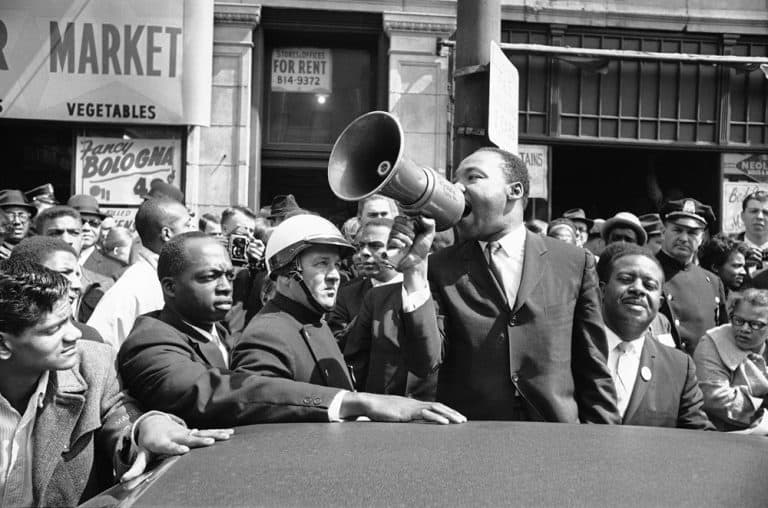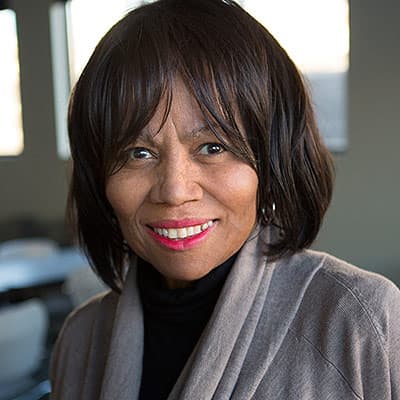Advertisement
45 Years Later, Boston Remembers MLK Jr.'s Death

Thursday marks the 45th anniversary of the assassination of the Rev. Dr. Martin Luther King Jr. The Nobel Peace Prize-winning civil rights leader was shot in Memphis, Tenn., on April 4, 1968.
In the 1950s, King studied in Boston, where he earned his doctorate from Boston University and met his wife. For those who lived and worked in Boston during the civil rights movement, the legacy of King continues to inform their work today.
On the day of King's death, former state Rep. Mel King was in Boston with the Urban League of Eastern Massachusetts.
"To have it [King's assassination] happen at that time, we knew that there was going to be a reaction," he said.
As an activist and community organizer, he and others wasted no time responding.
"Folks mobilized really quickly and were out in the streets, opened up some of the centers — South End House, Urban League — so that people could gather," he said. "We met, figured out how people would get out on the street, try to talk to the youths, try to stop cars from coming through the neighborhood so that they wouldn't be targets. But all the while having this deep, deep feeling of his tremendous loss and at the same time knowing that we would have to find ways to pick ourselves up and keep on moving in a way that he would expect."
Now a state representative, Gloria Fox was also working as a community organizer in Boston at the time of King's death.
"We were devastated by it, but we knew what we had to do, though, and that meant we had to continue to work as hard as we could with what was left of what we had," she said.
Advertisement
Fox vividly remembers what she was doing when she heard the news.
"We were meeting about education. We heard noises outside. We could hear people screaming in the street. Naturally I got on the phone to make sure my kids were all right. We finally went outside, and we stayed in the street pretty much all night long that night," Fox recalled. "There was all kinds of talk about there being riots and that the African-American community was going to blow, but for the most part we were just as stunned and just as hurt and just as angry about a senseless murder of a man that meant no harm and only good as the rest of the country and the rest of the clear-thinking world was."
Kenneth Guscott was in Jamaica on that fateful day. He is a leading businessman in Boston, and a former head of the Boston branch of the NAACP. On April 4, 1968, Guscott had just completed an interview with the BBC about the civil rights movement in the U.S. when he heard the news of King's assassination. Guscott took the next flight home.
"The city was quiet, but ominous quiet," he said. "The cab drivers at the airport, none of them would bring me into Roxbury, where I lived then. I finally got one driver who agreed to take me to Massachusetts and Columbus Avenue. That was the headquarters of the Boston branch of the NAACP. And when I got there, of course the office was loaded with people and they were doing their thing."
"Their thing" involved keeping the community from damaging itself in anger and frustration.
King, who in 1983 became the first black candidate for Boston mayor, explained the importance of collaboration within the community.
"There was always attempts to get folks from the different organizations, neighborhood groups to try and come together around particular activities," he said. "Residents have to be the major beneficiaries of what the city and they have to offer. It's not going to be that way until there is a coming together around not only proportional representation but proportional access to all the best that the city has to offer."
Fox says she has inherited a responsibility from MLK.
"If we are living in his footsteps then you have to celebrate his life and what he was trying to do and know that he was successful in involving a whole group of us standing in the wings waiting for our turn to play a role," Fox said.
Many of the issues that mobilized Fox, King and Guscott in the 1960s long before King's assassination are still as pressing today: the community's need for jobs, better housing and quality education.
This program aired on April 4, 2013.
